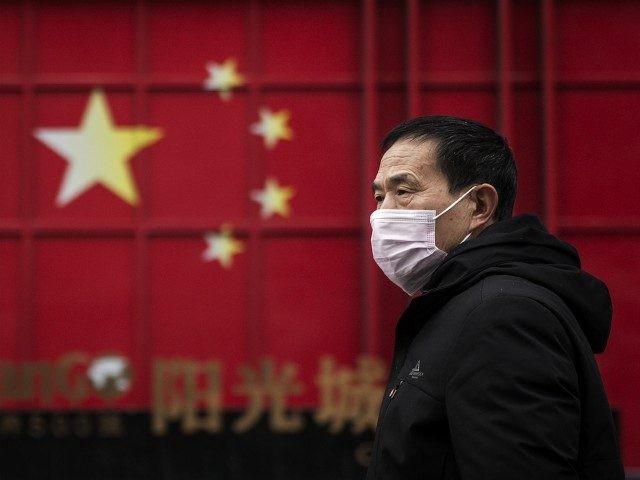China’s state-run Global Times on Tuesday denounced calls for the United States and Europe to decouple from Communist China after the Wuhan coronavirus pandemic as “delusional,” and insisted refusing to do business with Beijing could “cost lives.”
The Global Times warned that America and Europe are in no position to talk about barricading their economies against China because their economies are in bad shape due to the pandemic caused by the Chinese Communist Party’s (CCP) actions, and they desperately need medical goods that only China can provide:
While it remains unclear what kind of supply gap will be caused by the factory closings in the future, one thing is certain: the US is facing severe shortages of medical equipment. According to a survey of 213 city mayors, 91.5 percent of US cities were in short supply of face masks for first responders and medical personnel; 88.2 percent didn’t have sufficient personal protective equipment other than face masks; and 85 percent didn’t have a sufficient supply of ventilators.
As EU nations have already shut their doors on exporting critical medical goods during the pandemic, that leaves China as the only country with the manufacturing ability to meet US demand. That is surely the last thing some US Congress members want to hear, considering their persistent push for a US-China decoupling. But like it or not, it is the reality.
And the US isn’t just dependent on China for medical supplies, it also relies on China for daily commodities. According to information from the US National Retail Federation, over 41 percent of clothes, 72 percent of shoes and 84 percent of travel goods in the US market were made in China in 2018. In 2019, computers, cell phones, apparel and footwear were among the largest US imports from China.
The Global Times allowed that America could “continue seeking a break from China and its manufacturing sector” if it really wanted to, provided its people are willing to “make do with less.” However, this would not be a “rational choice” because “there is a growing risk of supply shortages globally and China may be their only hope for the time being.”
The Global Times upped the ante by saying American lives will be lost if the U.S. insists on cutting off the flow of Chinese medical supplies, pointing out that thanks to globalism, “about 80 percent of active pharmaceutical ingredients used in US drugs are supplied by China and India, which also provide 90 percent of generic drugs to Americans.”
“Those who seek a decoupling and ask China to compensate for their losses need to accept the fact that Americans need Chinese manufacturing more than they think,” the editorial concluded.
China Daily on Wednesday published a triumphalist editorial that said it would be a “tall order” for Western politicians to decouple now that China has supposedly conquered the Wuhan virus, restarted its manufacturing industry, and become the only fully-functioning industrial superpower in the world:
It is true that the pandemic has severely disrupted the global supply chain, affecting Chinese enterprises’ export orders. However, all that is temporary. In the early days of the epidemic, China did stop production in some sectors, upsetting the supply chain to global industries, such as automobiles and pharmaceuticals, relying excessively on Chinese intermediate products.
But China has resumed production, and it is the outbreak in other countries that is affecting global supply chains now. For example, Apple Inc has closed all its stores worldwide except in China, and the Volkswagen CEO has said there was no revenue in the global market outside of China. And Parkson China has said its plan to open 800-850 new stores in China this year remains unchanged. All this suggests China’s declining exports are a result of shrinking global demand following the spread of the pandemic instead of foreign products replacing Chinese orders or supply chains shifting to other regions.
US politicians will fail in their attempt at decoupling the US from China and promoting the movement of the supply chains elsewhere; it is difficult to decouple enterprises enjoying supply chain, cost and efficiency advantages.
The South China Morning Post (SCMP) struck a different tone, predicting that the coronavirus pandemic could damage China’s credibility, deliver a shock to its already weakened economy, and accelerate the anti-globalism process that began with President Donald Trump’s “America First” platform and the U.S.-China trade war. China’s standing should become more clear after the emergency G20 summit scheduled for next week.
“Demand for China’s exports has been collapsing just as local supply comes back on line. China’s industrial production, fixed-asset investment and retail sales collapsed in the first two months of the year due to Covid-19,” the SCMP noted.
Analysts told the SCMP they expected China to counter this trend by using the pandemic to their political advantage, positioning themselves as champion disease fighters and leaders of the globalist movement.
“It would be hard to believe that China will forgo this opportunity and not talk about its success in virus containment and the China model,” ventured research analyst Tianlei Huang of the Peterson Institute for International Economics.
The Financial Times also thought decoupling will become an “irreversible” extension of the trade battle that began after President Trump took office, noting that many American companies have already made plans to shift their supply chains from China to other Asian countries. American firms and universities are increasingly sensitive to the dangers of Chinese Communist technology theft and political influence, while the Trump administration has imposed significant restrictions on foreign sales of advanced technology.
Even the Internet, already heavily controlled and firewalled by the authoritarian Chinese regime, could further separate into what Paul Triolo of the Eurasia Group dubbed the “Splinternet.” Analysts told the Financial Times that true, firm “decoupling” could destabilize global politics, but a more strategic, less acrimonious process of separation might prevent a new Iron Curtain from slamming down between the West and a new Eastern adversary.

COMMENTS
Please let us know if you're having issues with commenting.